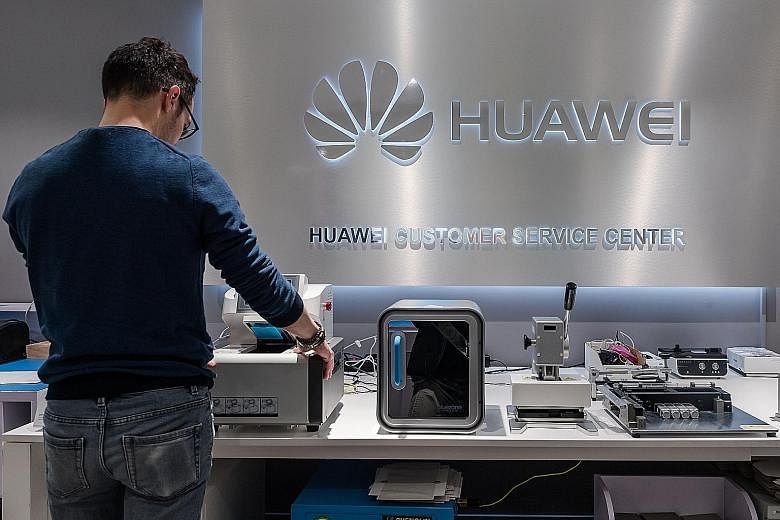WASHINGTON • America's global campaign to prevent its closest allies from using Huawei, the Chinese telecoms giant, in the next generation of wireless networks has largely failed, with foreign leaders publicly rebutting the US argument that the firm poses an unmanageable security threat.
Britain has called the Trump administration's bluff, betting that officials would back away from their threat to cut off intelligence-sharing with any country that used Huawei equipment in its network.
Apart from an angry phone call between US President Donald Trump and British Prime Minister Boris Johnson, Britain appears to be paying no price for its decision to let Huawei into limited parts of its network, under rigorous surveillance.
Germany now appears ready to follow a similar path, despite an endless stream of cajoling and threats by Secretary of State Mike Pompeo, Defence Secretary Mark Esper and other US officials.
Mr Pompeo and Mr Esper continued to hammer home the dangers of letting a Chinese firm into networks that control critical communications, saying it would give the Chinese government the ability to spy on or turn off those networks.
"It could well jeopardise all the information-sharing and intelligence-sharing we have been talking about, and that could undermine the alliance, or at least our relationship with that country," Mr Esper said last Saturday.
Yet officials sense their continued drumbeat of warnings is losing its punch in Europe. The US is now aiming to choke off Huawei's access to the US technology it needs and trying to cobble together a viable American-European alternative to compete with it.
The US is trying to contain China's influence and power, and ensure it does not come to dominate advanced industries that could give it an economic and military edge.
That includes the next-generation 5G telecommunications networks Huawei is building. Those superfast networks will control communications, critical infrastructure and devices that are already controlling factories, autonomous vehicles and the day-to-day operations of military bases.
The US is also trying to limit China's access to US technology more broadly and is considering restricting sales of microchips, artificial intelligence, robotics and some types of advanced software.
But the effort has been complicated by the lack of an alternative to the company, which offers low-cost telecoms equipment. The only real competitors are Nokia and Ericsson, which claim they have deployed more 5G networks than Huawei but which are clearly struggling to match its prices or its research and development.
US Attorney-General William Barr, Vice-President Mike Pence and other officials have offered differing US strategies to build a credible competitor to Huawei. Yet, at times, they have contradicted one another's ideas, often in public.
The fight over Huawei has put many European nations in a no-win position, forcing them to either rebuff a key ally's warnings or alienate China, a critical trading partner. Further complicating the decision is the lack of definitive US intelligence showing that Huawei has ever gained access to data that flows across its networks.
Germany, like Britain, is expected to keep Huawei out of the most sensitive parts of the telecoms network but allow it to provide equipment and software for the radio networks that control cell towers and base stations. This will still be a huge loss for the US, as Germany and Britain sit atop critical points along fibre-optic cables that are key to intercepting communications from Russia to the Middle East.
Meanwhile, Japan's Cabinet yesterday approved a Bill to support firms to develop secure 5G mobile networks and drone technologies amid growing alarm over the increasing influence of China's 5G technology. These firms will have access to low-interest-rate loans and tax incentives if they meet certain standards.
NYTIMES, REUTERS

